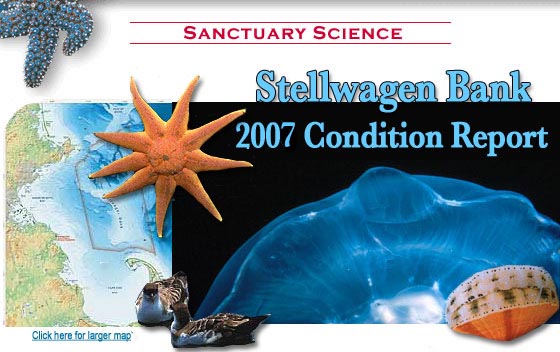 |
 |
|
 |

Error processing SSI file
Abstract
Stellwagen Bank National Marine Sanctuary contains one of the richest and most productive marine habitats in the U.S. It is home to a diverse fish community and serves as one of the most important feeding grounds in the North Atlantic for a number of migratory endangered whale species as well as some apex fish predators such as bluefin tuna and sharks. Located just offshore of the Boston metropolis of 4.8 million people, the sanctuary is subject to intense human use that includes whale watching, commercial and recreational fishing, vessel traffic, and nearby sewage and other material disposal. It may also soon be adjacent to a deepwater port for the transfer of liquefied natural gas, an activity that could pose additional hazards.
Despite these activities, most water quality parameters at Stellwagen Bank sanctuary appear to suggest relatively good conditions. For example, though numerous contaminants have been identified, they appear at levels that are not likely to affect sanctuary resources. Habitat quality, on the other hand, has deteriorated over many years, primarily as a result of long-term use of bottom dragging gear to catch fish. Fishing restrictions in some areas have led to improvements in habitat quality, and it is hoped that this will continue. Living resource conditions have followed trends similar to those of habitats, and are generally considered to be in fair or fair to poor condition. And while the abundance and diversity of bottom dwelling communities may improve with fishing restrictions, surface dwelling marine mammals are at considerable risk from strikes by increasing vessel traffic in New England and from entanglement from lines attached to fishing gear. The principal threat to maritime archaeological resources in the sanctuary comes from contact by bottom fishing gear. An additional concern regarding these historical sites is the fact that once damaged, there is no potential for recovery, as there is for water, habitat, and living resources.
The new management plan for Stellwagen Bank sanctuary is scheduled for release in the summer of 2007. It recommends a number of management actions that will address these concerns. The plan stresses an ecosystem-based approach to management that requires consideration of ecological interrelationships not only within the sanctuary, but within the larger context of the Gulf of Maine ecosystem. It also points to the need for an increased level of cooperation with other management agencies in the region. Specific management recommendations include an improved water quality monitoring program; actions to reduce vessel discharges; actions to reduce the number of vessel strikes on whales and the number of entangled whales; investigations of noise sources and impacts; and management of maritime archaeological resources.
|
|
 |



